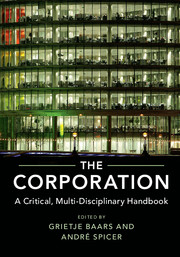Book contents
- Frontmatter
- Contents
- List of Contributors
- Acknowledgements
- Introduction: Why the Corporation?
- PART I DISCIPLINARY OVERVIEWS
- PART II INTERDISCIPLINARY THEMATIC CHAPTERS
- 1 The Evolution of the Corporate Form
- 2 The Multinational Corporate Group
- 3 The Financialization of the Corporation
- 4 Corporate Value Chains
- 5 Corporate Citizenship
- a The Functions and Dysfunctions of Corporate Social Responsibility
- b Reconsidering the Critical Corporate Social Responsibility Perspective through French Pragmatic Sociology: Subverting Corporate Do-Gooding for the Common Good?
- c Certification Schemes and Labelling as Corporate Governance: The Value of Silence
- 6 The Corporation and Crime
- 7 The Corporation and Ideology
- 8 Corporation and Communities
- 9 Corporations and Resistance
- 10 Alternatives to the Corporation
- Index
- References
b - Reconsidering the Critical Corporate Social Responsibility Perspective through French Pragmatic Sociology: Subverting Corporate Do-Gooding for the Common Good?
from 5 - Corporate Citizenship
Published online by Cambridge University Press: 31 March 2017
- Frontmatter
- Contents
- List of Contributors
- Acknowledgements
- Introduction: Why the Corporation?
- PART I DISCIPLINARY OVERVIEWS
- PART II INTERDISCIPLINARY THEMATIC CHAPTERS
- 1 The Evolution of the Corporate Form
- 2 The Multinational Corporate Group
- 3 The Financialization of the Corporation
- 4 Corporate Value Chains
- 5 Corporate Citizenship
- a The Functions and Dysfunctions of Corporate Social Responsibility
- b Reconsidering the Critical Corporate Social Responsibility Perspective through French Pragmatic Sociology: Subverting Corporate Do-Gooding for the Common Good?
- c Certification Schemes and Labelling as Corporate Governance: The Value of Silence
- 6 The Corporation and Crime
- 7 The Corporation and Ideology
- 8 Corporation and Communities
- 9 Corporations and Resistance
- 10 Alternatives to the Corporation
- Index
- References
Summary
Introduction
Although critical management studies (CMS) scholars have for long stayed at a distance from the corporate social responsibility (CSR) discourse and practice, the resurgence of CSR since the mid-1990s – ‘CSR mainstreaming’ in managerial parlance – made CSR worthy of their critical interest. Central to the ‘critical CSR perspective’ are three lines of analysis: (a) the deconstruction of current CSR discourse and practice (Banerjee, 2003; Markowitz, 2008); (b) the theorization of CSR development as a process of colonization of social, political and ethical spheres (Roberts, 2003; Shamir, 2005); and (c) the study of CSR as either a ‘convenient smokescreen’, a ‘parasite’ or a ‘predatory practice’ that aims at maintaining capitalism's power (Jones, 1996; Fleming and Jones, 2013). Critical CSR works have certainly enhanced the reflexivity of CSR scholars by ‘un-naturalizing’ some ‘taken-for-granted’ assumptions, concepts and discourses of the field and by approaching CSR as ‘socio-economic phenomenon’ rather than a ‘business issue’ (Hanlon and Fleming, 2009: 937). They also led CMS authors to call for ‘the end of CSR’ (Fleming and Jones, 2013).
Interestingly, the rhetoric of ‘the end of CSR’ has been used recently to back the concept of ‘connected leadership’ by Lord John Browne, the former CEO of British Petroleum (Browne et al., 2015). This kudos from the ex-leader of the corporation once seen as an ideal case of CSR greenwashing by the authors of The End of Corporate Social Responsibility does not come as a surprise. It is just another instance of capitalism's recycling of its own critique (Boltanski and Chiapello, 2005[1999]). However, it also indicates that the ‘critical CSR perspective’ may well ultimately serve the capitalist status quo on the same basis as the CSR practice and discourse that it has once criticized, denunciated and/or deconstructed.
Rejecting CSR as currently practised because it ‘side-pocketed’ important social and environmental issues is certainly a convenient way for Browne et al. (2015) to repackage past CSR discourse and practice through different labels and hence keep going the managerial fad and fashion industry (Abrahamson, 1996) while avoiding taking too seriously ‘aspirational’ CSR discourses (Christensen et al., 2013).
- Type
- Chapter
- Information
- The CorporationA Critical, Multi-Disciplinary Handbook, pp. 360 - 371Publisher: Cambridge University PressPrint publication year: 2017
References
- 3
- Cited by

